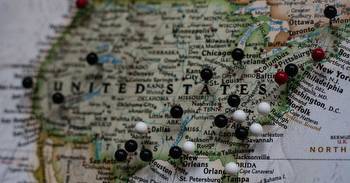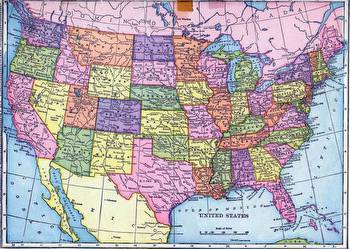How Regulated is the Online Casino Industry in the US?

Legal online casino gaming is spreading rapidly across the US. Surprisingly, most states legalized the industry only after the Supreme Court struck down the PASPA Act in 2018.
States have had the authority to regulate online casinos since 2011. This is when the Department of Justice replied to New York and Illinois’ inquiry on whether they could sell lottery tickets online.
The DOJ said every state had the right to license online casinos and lotto games. They just couldn’t offer sports betting. Of course, everything changed in 2018—states now possess the power to license all forms of iGaming.
New Jersey legalized online poker in 2011; the same year the DOJ gave states a green light to regulate the industry. It expanded legal iGaming to include casino games like slots, blackjack, and roulette in 2013.
Because of legalizing online casinos early on, New Jersey is one of the biggest markets for online gambling in the US. Last year, the Garden State generated $5.21 billion from the sector, a 10% increase compared to 2021.
To be clear, NJ’s revenue included money generated from online casinos, sports betting, and land-based casinos. Online casinos alone made $1.66 billion in 2022 and $5.5 billion since 2013.
What’s New Jersey’s secret for iGaming success? The first explanation is that Garden State legalized gambling long before other states. As such, it attracted a huge market in both NJ and neighboring states like New York and Pennsylvania.
Another reason for the industry’s quick growth in NJ is that the state has progressive laws. NJ is home to some of the best Bitcoin casinos USA. It hosts more than a dozen sportsbooks and sites that specialize in poker.
Pennsylvania legalized online casinos in 2017, two years before it also authorized sports betting. The Keystone State legalized iGaming to fight black market casinos and increase its tax revenues.
So far, the state has legalized 18 online casinos. These websites provide slot machines, blackjack, poker, lotto, and other table games. Some of them also feature sports betting.
Similar to New Jersey, gambling is legal only for players above 21 years. Also, you must be within the state borders to access online casinos. The state uses geo-fencing to prohibit anyone outside PA from using its casino sites.
With that said, Pennsylvania has relatively high taxes for online casinos. They part with 54% of the money made from slots as tax. They pay an additional 14% tax when they make money on table games.
Nevada used to be the only state with legal gambling laws for years. It still reigns supreme in the land-based casino sector. However, it struggles to keep up with iGaming revenues generated by New Jersey and Pennsylvania. Here’s why.
Although the Desert State permits online poker, it prohibits casino games like slots and blackjack. The explanation is that Nevada does not want to provide unfair competition to its brick-and-mortar casinos.
The state allows mobile sports betting, though. Most of these sportsbooks are operated by casinos located on the strip. Last year, casinos in Nevada made $14.84 billion—a new all-time record.
Delaware first legalized online casinos in 2012. It was the second state to legalize the industry. It expanded iGaming to include sports betting in 2018. Surprisingly, the Diamond State only permits three casino sites.
What’s more, it does not allow online sports betting. If you want to bet on sports in the First State, you must show up at a local casino in person. That said, Delaware makes a lot of money from iGaming for a state with one million people.
In 2022, Delaware generated $825 million from legal casino gaming and sports betting. It would have made a lot more money according to state officials. However, increased mobile betting legalization laws in neighboring states have been a blow to in-person sportsbooks.
Michigan’s bet on online casinos turned out to be a success after the state generated $2 billion in its second year of legalizing the industry. MI generated $1.40 billion from online casinos in 2021, proving Americans everywhere are changing their stance on iGaming.
Unlike New Jersey, Michigan generated the bulk of its 2022 revenue from online casinos. They added $1.58 billion to the state’s economy. Sports betting contributed $400 billion to the income.
Michigan has 15 online casinos and sportsbooks. It will probably license more betting sites in the future. But considering it also hosts 30 brick-and-mortar casinos, gamblers in the Great Lake State have plenty of betting options.
West Virginia legalized online casinos and sports betting in 2019. Today, the Mountain State has nine online casinos, including major brands like DraftKings and FanDuel.
West Virginia competes closely with Delaware in terms of gambling revenues. Last year, the state made $769 million from the industry, a 16% growth compared to 2021.
One of the reasons WV’s iGaming sector has grown in the past year has a lot to do with its laws. Unlike Pennsylvania or New York, the Mountain State has affordable taxes. It charges casinos 15% of their income while gamblers pay a 6.5% tax.
As mentioned, the state permits all forms of online gambling. This ensures that no gambler in the state has to visit neighboring states to bet on sports online. Neither do they need to use offshore casinos.
Although states can legalize online casinos, the majority of them are yet to do so. Many of them are prioritizing sports betting. In fact, over 30 states permit in-person or mobile sports betting.
Fortunately, things are changing for the better. New York, Indiana, Iowa, Illinois, and Florida are all working on bills to legalize online casinos. Some of them—Illinois—permit sweepstake casinos.
Also, they make hundreds of millions of dollars from sports betting. They know the benefits of expanding legal gambling laws. The only challenge is that casino gaming doesn’t get as much love as sports betting.
With that in mind, some states have vowed not to legalize online gambling any time soon. Hawaii and Utah are excellent examples.




































